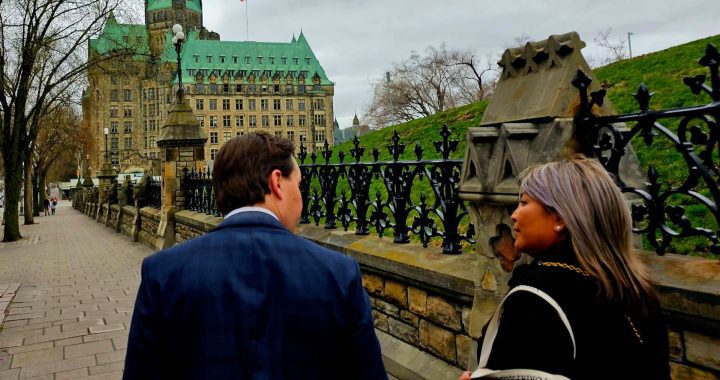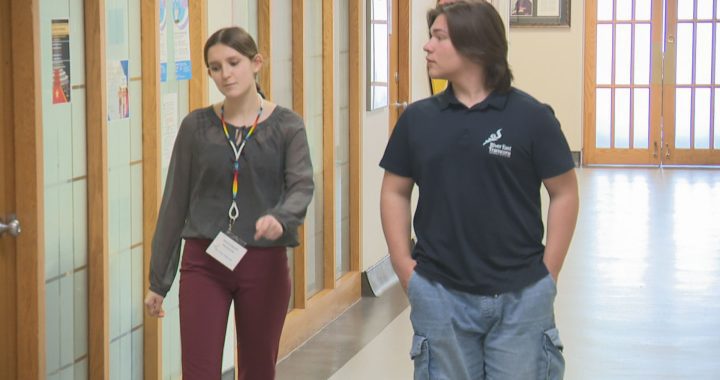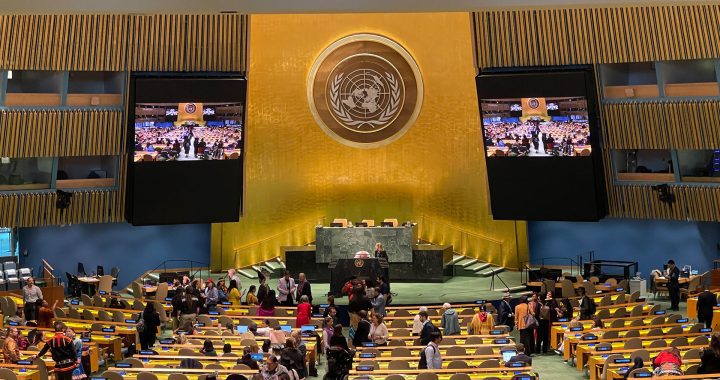Karyn Pugliese
APTN News
Along the shores of Manitoba’s Island Lake region rests the remote community of St. Theresa Point First Nation. Located 465 km from Winnipeg, the community of 4,500 is only accessible by plane or winter roads.
It is here where Helena Wood called home for most of her life. It is here where the 39-year-old married her high school sweetheart and the two started a family. And, it is here where her first-born died by suicide eight years ago.
Helena was 16-years-old when she gave birth to her first daughter Cassandra Wood. She would later go on to marry Cassandra’s father once she turned 18.
Five years ago the two divorced. APTN has decided not to publish the father’s name.
Their marriage was not a happy one. The beatings began early on in the relationship. They would begin once the children went to bed and, at times, would carry on all night. The walls of Cassandra’s bedroom shielded her from witnessing the violence but it couldn’t block Helena’s cries.
Cassandra seemed to feel the violence the most. She documented the violence in her journal. Her words are candid. In one passage dated Jan. 15, 2009 she wrote, “I think my dad is mad. I’m scared here. I don’t know what to do. I’m sick and tired of them fighting so much.”
APTN obtained a copy of a special investigative report done by Manitoba’s Children’s Advocate Office outlining events leading up to and after Cassandra’s death.
According to the report Island Lake First Nations Family Services (ILFNFS) first intervened in December 2008 when Cassandra told local health workers she didn’t want to go home because of the violence. Helena and Cassandra’s father met with ILFNFS, Holistic Health Services and Justice representatives. She says they offered tough love and little else, but there were serious signs Cassandra was suffering.
“You guys need to smarten up or else you guys are going to lose custody of Cassandra soon. She’s already cutting herself. She’s already hanging herself. That’s all they ever said,” said Helena.
She wonders if more could have been done.
“Come to think of it now I thought if you knew all the signs how come you didn’t take action?”
Helena admits at the time she didn’t see it either. She was too preoccupied with the violence in the home. She turned to alcohol to numb the physical pain inflicted on her and the emotional pain that came as a result.
“My daughter kept saying to me, ‘mom, what are you doing? Just leave dad. Can we move please? Can we get out of here? I want to move out of here. Why do you always take his side over your kids?’” recalls Helena. “I had nothing to say. Well the stupid answer would be because I loved him.”
Helena never left. And, despite the handful of times ILFNFS met with Helena and her husband all the children remained in the home.
But Helena’s cousin Stephanie Wood is hesitant to blame the agency. As a teacher at the local school she deals with kids in care on a regular basis.
“We do our best. CFS does its best. Policing does its best. All the social services do their best,” said Wood. “But you know what there’s still a child involved here.”
While many services were involved with the Wood family, it wasn’t enough.
On Friday Feb. 26, 2010 Cassandra died by suicide. Her body was found a day later. The teen hung herself in a garage near the community’s high school. She was only 15-years-old.
Earlier this month Helena visited the spot where her body was found. Memories of that day hung heavy.
“It was supposed to be me not her. That’s what kept going through my mind. It was supposed to be me not her,” said Helena.
Helena last saw her daughter that Friday morning before Cassandra went to school. Helena went to work at the community’s Northern Store. She came home later that evening and found Cassandra had not returned from school.
She didn’t think much of it and assumed Cassandra was with her boyfriend. When she still hadn’t returned Saturday morning Helena began to worry. She went back to work on her family’s advice and waited patiently for Cassandra to be found. Later that afternoon Cassandra’s boyfriend found her body in the garage.
Stephanie was tasked with telling Helena who was still at work at the time.
“We had to take the long walk to the back of the store. I was watching her. I was like how could she even walk. She didn’t even know where her daughter was and here I was about to tell her what they had found. That Cassandra had hung herself,” said Stephanie.
It’s a moment that still grips Stephanie eight years later.
“To this day I still can’t believe how blunt I was, but how do you sugar coat that? How do you make that sound okay?”
Shortly after her second eldest daughter, Jewel, began to harm herself. Helena recalls one night when Jewel climbed a tree outside the family home with the intention of hanging herself. She saw the leaves and branches at the top of the tree shake. She ran outside only to find Jewel perched more than 20 feet above her. A neighbour came running out, climbed the tree and brought Jewel down.
This woke Helena up. In August, nearly six months after Cassandra’s death, Helena fled to Winnipeg with her kids and a few belongings. She settled in Steinbach located 58 km southeast of the city.
Away from the abuse Helena thought she saw an end in sight, but a new fight was just beginning. Dealing with the aftermath of Cassandra’s death and the decision to finally leave an abusive relationship Helena relied on alcohol to help cope with the pain.
“Even though I left [St. Theresa Point] there was a cycle that followed me. I went out there to [Steinbach] to find more resources, and I did, but [CFS] turned it on me,” said Helena.
As Helena continued to drink her relationship with her children began to deteriorate. Helena looked for mental health resources for her kids to help them cope with the loss of their sister and she looked for counseling for herself to help with her addictions. She was met with silence. Child and family services apprehended Jewel and her son Austin because of the drinking. Jewel chose to move back to St. Theresa Point to live with her father. Austin was sent to another home.
Helena wrote three letters to CFS asking for help with her addictions. In one she wrote, “I feel like I’ve been mistreated and victimized by the system again. And yet that was the whole point I came down here to get the proper help I need for me and my children. Instead just got ignored and being misunderstood.”
After submitting the letters to the agency she was assigned a new caseworker. She was finally told the kids would be returned if she got clean.
For the first time since moving to Steinbach Helena was getting the help she needed.
“That’s when I said okay I’m going to quit drinking. I finally got what I wanted,” said Helena. “I’m going to show [CFS] who [they’ve] being fighting with.”
Jewel and Austin have since aged out of the child welfare system.
Helena relied on the support of family and friends to help her get clean. One of those friends was Maxine Schindler. She lives in Steinbach where she’s spent the last 10 years fostering children with her husband. She watched Helena search for help. She says it is a common story for mothers who have kids in the system.
“They would come for help and instead of helping them [CFS] would take their children away. Well then who’s going to come for help then? Who’s going to come for help if the first thing [CFS] does is take their children away?” said Schindler.
Last fall the provincial government announced an overhaul of the child welfare system. The province said it would move away from a model where agencies see funding based on the number of kids in care to one that is based off block funding. It says this will help put more money into prevention and intervention.
But for Schindler funding for resources is just one piece of the puzzle. She believes social workers need to work with families to educate them on the options available to address addictions, mental health issues and trauma.
“The help was out there but how to access it was not possible,” said Schindler. “If you didn’t know how to fight you didn’t get the help.”










I was 14 in Winnipeg in 1985, Winnipeg CAS played hot potatoe with my life. They sent me to numerous gtoup homes and receiving homes finally they gave me a one way ticket to thunder bay after they CAS gave me the bums rush. I was not at risk as much as I was in CAS care. They discharged me several times. I slept with my frienda in garages under apartment building stairways and sometimes didn’t have a safe place to sleep so I didnt. When I arrived to thunder bay the sovial worker failed to inform my parent which date I would arriving. I sat at that greyhound terminal for 11 hours by myself before security asked me where and why I was there. I headed back to Winnipeg same year, well if they CAS didn’t give another one way ticket out to kamloops bc to find my parent. Luckily my parent was there to meet me. CAS did no follow up. For example if I’d gone missing. They would have time to clear the paper trail if I was continually discharged. I was not a runner and I didnt use drugs or alcohol. I was not sexually active. The one thing that I remember unnmistakingly is that being a kid in CFS care, We don’t easily forget anything. That’s right CFS, we are not as resilient, as you always assumed. We remember it all we remember everything!!!
I was 14 in Winnipeg in 1985, Winnipeg CAS played hot potatoe with my life. They sent me to numerous gtoup homes and receiving homes finally they gave me a one way ticket to thunder bay after they CAS gave me the bums rush. I was not at risk as much as I was in CAS care. They discharged me several times. I slept with my frienda in garages under apartment building stairways and sometimes didn’t have a safe place to sleep so I didnt. When I arrived to thunder bay the sovial worker failed to inform my parent which date I would arriving. I sat at that greyhound terminal for 11 hours by myself before security asked me where and why I was there. I headed back to Winnipeg same year, well if they CAS didn’t give another one way ticket out to kamloops bc to find my parent. Luckily my parent was there to meet me. CAS did no follow up. For example if I’d gone missing. They would have time to clear the paper trail if I was continually discharged. I was not a runner and I didnt use drugs or alcohol. I was not sexually active. The one thing that I remember unnmistakingly is that being a kid in CFS care, We don’t easily forget anything. That’s right CFS, we are not as resilient, as you always assumed. We remember everything!!!
I was 14 in Winnipeg in 1985, Winnipeg CAS played hot potatoe with my life. They sent me to numerous gtoup homes and receiving homes finally they gave me a one way ticket to thunder bay after they CAS gave me the bums rush. I was not at risk as much as I was in CAS care. They discharged me several times. I slept with my frienda in garages under apartment building stairways and sometimes didn’t have a safe place to sleep so I didnt. When I arrived to thunder bay the sovial worker failed to inform my parent which date I would arriving. I sat at that greyhound terminal for 11 hours by myself before security asked me where and why I was there. I headed back to Winnipeg same year, well if they CAS didn’t give another one way ticket out to kamloops bc to find my parent. Luckily my parent was there to meet me. CAS did no follow up. For example if I’d gone missing. They would have time to clear the paper trail if I was continually discharged. I was not a runner and I didnt use drugs or alcohol. I was not sexually active. The one thing that I remember unnmistakingly is that being a kid in CFS care, We don’t easily forget anything. That’s right CFS, we are not as resilient, as you always assumed. We remember it all we remember everything!!!
I was 14 in Winnipeg in 1985, Winnipeg CAS played hot potatoe with my life. They sent me to numerous gtoup homes and receiving homes finally they gave me a one way ticket to thunder bay after they CAS gave me the bums rush. I was not at risk as much as I was in CAS care. They discharged me several times. I slept with my frienda in garages under apartment building stairways and sometimes didn’t have a safe place to sleep so I didnt. When I arrived to thunder bay the sovial worker failed to inform my parent which date I would arriving. I sat at that greyhound terminal for 11 hours by myself before security asked me where and why I was there. I headed back to Winnipeg same year, well if they CAS didn’t give another one way ticket out to kamloops bc to find my parent. Luckily my parent was there to meet me. CAS did no follow up. For example if I’d gone missing. They would have time to clear the paper trail if I was continually discharged. I was not a runner and I didnt use drugs or alcohol. I was not sexually active. The one thing that I remember unnmistakingly is that being a kid in CFS care, We don’t easily forget anything. That’s right CFS, we are not as resilient, as you always assumed. We remember everything!!!
Ican relate to this story of the thousands I’ve heard over the years. I grew up in the CFS system I was moved from home to home and no help was ever given to my parents.I went from the Children’s Aid Society of Eastern Manitoba to the streets then prison When I emerged from the prison system in 1971 I went back to the streets working them and finding only kids like myself out there. I attempted Suicide and almost succeeded in 1972. Drugs and alcohol and prostitution were my only alternatives. Today I work in the social service area working with my sisters who are doing the same thing I did There needs to be an overhaul of the whole system. Our children are not $ signs. They are beautiful damaged human beings who deserve an opportunity to show the world that They Matter. I want to see a change in the way that the CFS System operates. I want to see Social Workers accountable to the children they are supposed to Protect. I would love to see programs that work with the families rather than against them.
Ican relate to this story of the thousands I’ve heard over the years. I grew up in the CFS system I was moved from home to home and no help was ever given to my parents.I went from the Children’s Aid Society of Eastern Manitoba to the streets then prison When I emerged from the prison system in 1971 I went back to the streets working them and finding only kids like myself out there. I attempted Suicide and almost succeeded in 1972. Drugs and alcohol and prostitution were my only alternatives. Today I work in the social service area working with my sisters who are doing the same thing I did There needs to be an overhaul of the whole system. Our children are not $ signs. They are beautiful damaged human beings who deserve an opportunity to show the world that They Matter. I want to see a change in the way that the CFS System operates. I want to see Social Workers accountable to the children they are supposed to Protect. I would love to see programs that work with the families rather than against them.